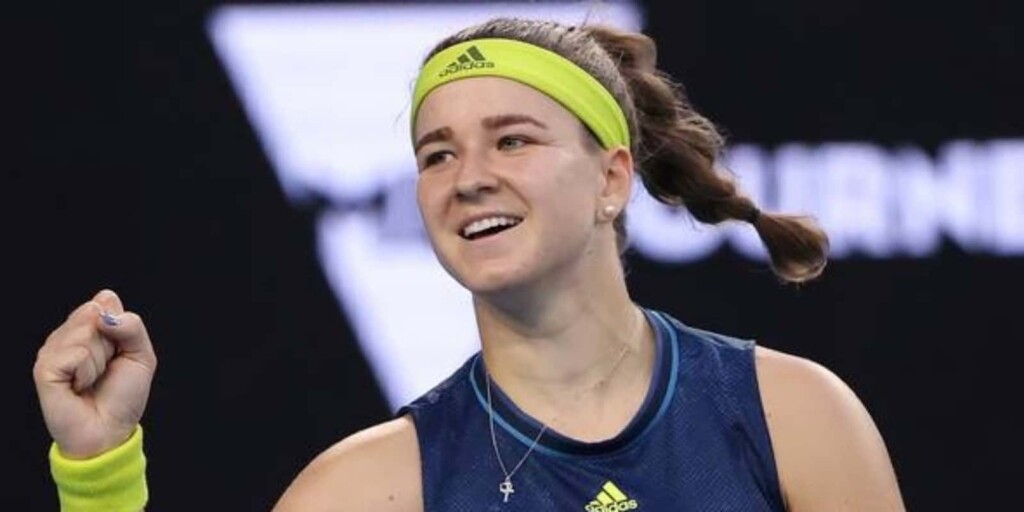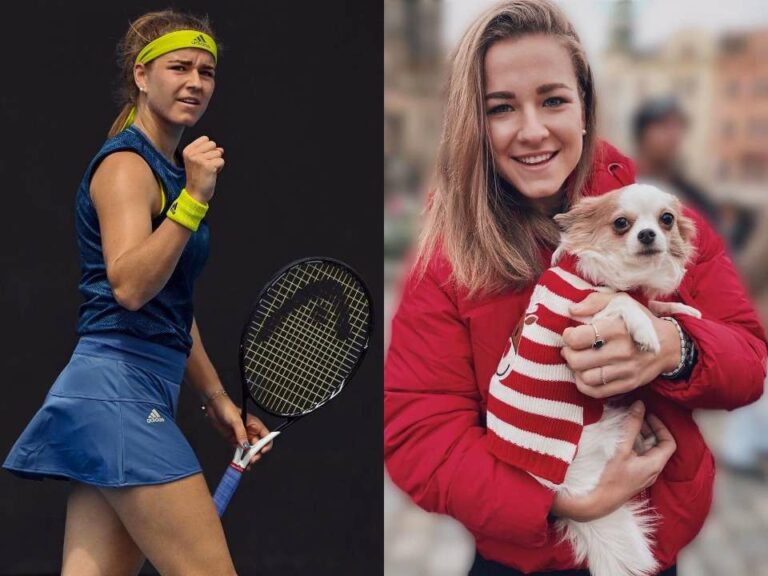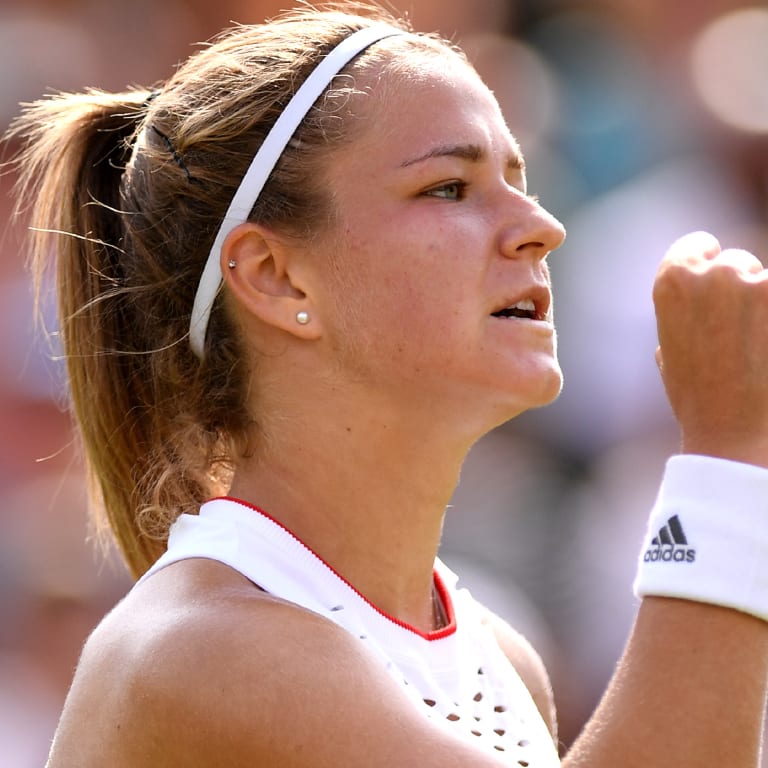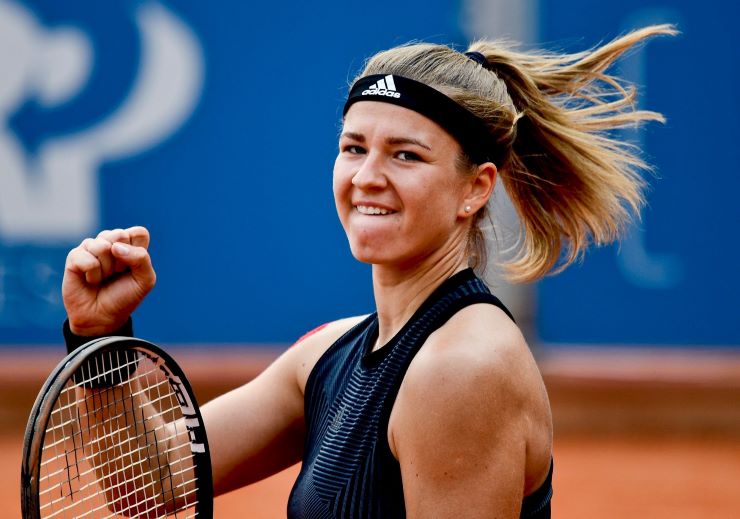Karolina Muchova's Coach, David Kotyza: A Behind-the-Scenes Look
David Kotyza, a renowned tennis coach, has guided Karolina Muchova to remarkable success on the WTA Tour. Kotyza's expertise in biomechanics, strategy, and mental training has proven invaluable, helping Muchova reach new heights in her career.
This article explores the integral role of Kotyza in Muchova's journey, examining his innovative coaching methods, their impact on Muchova's game, and the historical significance of their partnership.
Karolina Muchova's Coach
David Kotyza, the esteemed coach of Karolina Muchova, plays a pivotal role in her tennis career. His expertise encompasses various essential aspects, including:
- Technical proficiency
- Strategic planning
- Mental fortitude
- Physical conditioning
- Nutritional guidance
- Injury prevention
- Tournament scheduling
- Media relations
Kotyza's profound understanding of these aspects has enabled Muchova to achieve remarkable success. His technical prowess has refined her strokes, while his strategic acumen has empowered her to outmaneuver opponents. Kotyza's focus on mental resilience has bolstered Muchova's confidence and composure on the court. Moreover, his emphasis on physical conditioning and injury prevention has ensured her longevity and peak performance.
| Born | 1977 |
| Nationality | Czech |
| Occupation | Tennis coach |
| Years active | 2000-present |
Technical proficiency
Technical proficiency is at the core of David Kotyza's coaching philosophy. He meticulously analyzes Karolina Muchova's technique, identifying areas for improvement and developing tailored drills to enhance her strokes, movement, and overall performance on the court.
- Grip and swing mechanics
Kotyza has refined Muchova's grip and swing mechanics, resulting in increased power, accuracy, and consistency in her shots.
- Footwork and movement
He has also improved Muchova's footwork and movement, enabling her to cover the court more efficiently, anticipate opponents' shots, and react quickly to changing game situations.
- Shot selection and strategy
Kotyza collaborates with Muchova to develop effective shot selection and match strategies. He helps her identify patterns in opponents' play and devise tactics to exploit their weaknesses.
- Biomechanics and injury prevention
Kotyza has a deep understanding of biomechanics, which enables him to optimize Muchova's technique to minimize the risk of injuries and maximize her performance.
By honing Muchova's technical proficiency, Kotyza has played a crucial role in her rise to the top ranks of women's tennis. Her improved technique has translated into greater confidence, precision, and overall effectiveness on the court.
Strategic planning
Strategic planning is a critical component of David Kotyza's coaching approach with Karolina Muchova. It involves developing long-term goals, analyzing opponents, and devising match strategies to maximize Muchova's chances of success. Kotyza's strategic acumen has been instrumental in Muchova's ascent to the top ranks of women's tennis.
One of the key benefits of strategic planning is that it enables Kotyza and Muchova to identify and exploit their opponents' weaknesses. By carefully studying an opponent's playing style, Kotyza can develop a game plan that neutralizes their strengths and capitalizes on their weaknesses. For example, if an opponent has a weak backhand, Kotyza may instruct Muchova to hit more shots to that side of the court.
Strategic planning also helps Kotyza and Muchova to adapt to different playing conditions. For instance, if a match is being played on a fast court, Kotyza may advise Muchova to play more aggressively and go for winners. Conversely, if the court is slow, he may instruct her to be more patient and focus on consistency.
Overall, strategic planning is an essential part of David Kotyza's coaching philosophy. It enables him to maximize Karolina Muchova's potential and help her achieve her goals on the court.
Mental fortitude
Mental fortitude is a critical component of Karolina Muchova's success as a tennis player. Her ability to stay focused, composed, and resilient under pressure has been a key factor in her rise to the top ranks of the WTA Tour. David Kotyza, Muchova's coach, has played a vital role in developing her mental fortitude.
One of the most important things that Kotyza has taught Muchova is the importance of staying positive. Even when she is losing, Muchova never gives up. She believes in herself and her ability to win. This positive attitude has helped her to overcome many challenges and achieve great success.
Another important aspect of mental fortitude is the ability to learn from mistakes. Muchova is not afraid to make mistakes. She knows that mistakes are a natural part of the learning process. When she makes a mistake, she analyzes what went wrong and makes adjustments so that she can avoid making the same mistake in the future. This ability to learn from her mistakes has helped Muchova to improve her game and become a more consistent player.
Finally, mental fortitude is also about being able to stay focused and composed under pressure. Muchova is able to stay focused on the task at hand, even when she is facing a tough opponent or playing in a high-pressure situation. She does not let the pressure get to her, and she is able to maintain her composure and make good decisions.
Overall, mental fortitude is a critical component of Karolina Muchova's success as a tennis player. David Kotyza has played a vital role in developing her mental fortitude, and he continues to support her as she strives to achieve even greater success.
Physical conditioning
Physical conditioning is a critical component of Karolina Muchova's success as a tennis player. Her ability to maintain peak physical condition allows her to compete at the highest level, recover quickly from matches, and avoid injuries. David Kotyza, Muchova's coach, has played a vital role in developing her physical conditioning program.
Kotyza has designed a comprehensive training program that focuses on strength, speed, agility, and endurance. Muchova spends several hours each week in the gym, working with a strength and conditioning coach to improve her physical fitness. She also does regular cardio workouts, such as running and swimming, to improve her endurance. In addition, Kotyza has developed a nutrition plan for Muchova that ensures she is eating the right foods to fuel her body for training and competition.
The benefits of Muchova's physical conditioning program are evident on the court. She is able to hit the ball with power and accuracy, and she has the stamina to compete in long, grueling matches. Muchova is also able to recover quickly from matches, which allows her to play at her best day after day. In addition, her physical conditioning has helped her to avoid injuries, which is essential for a professional tennis player.
Overall, physical conditioning is a critical component of Karolina Muchova's success as a tennis player. David Kotyza has played a vital role in developing her physical conditioning program, and he continues to support her as she strives to achieve even greater success.
Nutritional guidance
Nutritional guidance is an integral aspect of David Kotyza's coaching approach with Karolina Muchova. A well-balanced and tailored nutrition plan is essential for Muchova's physical performance, recovery, and overall well-being, enabling her to sustain her peak fitness and perform consistently at the highest level.
- Dietary planning
Kotyza collaborates with a registered dietitian to develop personalized meal plans that meet Muchova's specific nutritional needs. These plans consider her training intensity, competition schedule, and individual dietary preferences.
- Hydration management
Kotyza emphasizes the importance of proper hydration for Muchova's physical performance. He ensures that she consumes adequate fluids, especially water and electrolyte drinks, to maintain optimal hydration levels during training and matches.
- Supplementation guidance
Kotyza provides Muchova with guidance on the appropriate use of supplements, such as vitamins, minerals, and protein powders. He ensures that she understands the potential benefits and risks of supplementation and advises her on safe and effective usage.
- Education and counseling
Kotyza educates Muchova on the principles of healthy eating and the importance of making informed nutritional choices. He encourages her to develop a positive relationship with food and to adopt sustainable dietary habits for long-term health and performance.
By providing comprehensive nutritional guidance, Kotyza empowers Muchova to make informed decisions about her diet and optimize her physical condition. This tailored approach contributes to her overall health, performance, and longevity as a professional tennis player.
Injury prevention
Injury prevention is a critical component of Karolina Muchova's success as a tennis player. Her ability to stay healthy and avoid injuries has been a key factor in her rise to the top ranks of the WTA Tour. David Kotyza, Muchova's coach, has played a vital role in developing her injury prevention program.
One of the most important things that Kotyza has done is to educate Muchova on the importance of proper warm-up and cool-down routines. Warming up before a match or practice session helps to prepare the body for activity and reduce the risk of injury. Cooling down after activity helps to reduce muscle soreness and stiffness. Muchova also does regular stretching and strengthening exercises to help prevent injuries.
In addition to her warm-up and cool-down routines, Muchova also follows a strict nutrition plan. Eating a healthy diet helps to keep her body strong and healthy, which can help to prevent injuries. Muchova also gets regular massages to help reduce muscle tension and soreness.
Kotyza's injury prevention program has been very effective for Muchova. She has been relatively injury-free throughout her career, which has allowed her to compete at the highest level. Muchova's success is a testament to the importance of injury prevention for tennis players.
Tournament scheduling
Tournament scheduling plays a critical role in the success of Karolina Muchova's tennis career and is an integral component of David Kotyza's coaching strategy. Effective tournament scheduling allows Muchova to optimize her performance, manage her physical well-being, and achieve her competitive goals.
Kotyza carefully plans Muchova's tournament schedule to ensure optimal spacing between events, allowing for sufficient recovery time and preventing burnout. He considers the intensity and duration of each tournament, as well as Muchova's physical and mental state, to create a schedule that maximizes her chances of success. This strategic approach helps Muchova maintain peak performance throughout the season and reduces the risk of injuries.
For example, during the 2021 season, Kotyza strategically scheduled Muchova's tournaments to allow for adequate rest and recovery after Grand Slams and other demanding events. This scheduling strategy contributed to Muchova's impressive performance, which included reaching the semifinals of the Australian Open and the quarterfinals of Wimbledon.
Understanding the connection between tournament scheduling and Muchova's success has practical applications for tennis players and coaches. By carefully planning tournament schedules, players can optimize their performance, reduce the risk of injuries, and extend their careers. Coaches play a vital role in guiding players through the complexities of tournament scheduling, ensuring that their training and competition plans are aligned with their long-term goals.
Media relations
Media relations is an essential aspect of Karolina Muchova's success as a professional tennis player and is an important component of David Kotyza's coaching strategy. Effective media relations allows Muchova to manage her public image, connect with fans and sponsors, and promote her brand.
Kotyza understands the power of media relations and actively works to cultivate positive relationships with journalists and media outlets. He regularly arranges press conferences, interviews, and social media interactions for Muchova, providing her with a platform to share her story and engage with her audience.
For example, during Muchova's run to the semifinals of the 2021 Australian Open, Kotyza ensured that she was available for media interviews after each match. This allowed Muchova to share her thoughts and feelings about her performance, connect with fans, and build her profile. Kotyza's media relations efforts also helped to secure sponsorship deals for Muchova, further enhancing her financial stability and supporting her career.
Understanding the connection between media relations and Karolina Muchova's success has practical applications for tennis players and coaches. By effectively managing media relations, players can enhance their public image, attract sponsors, and build a loyal fan base. Coaches play a vital role in guiding players through the media landscape, ensuring that their interactions with the media are positive and beneficial.
In conclusion, the exploration of Karolina Muchova's coach, David Kotyza, reveals the multifaceted and collaborative nature of their partnership. Kotyza's expertise in technical proficiency, strategic planning, mental fortitude, physical conditioning, nutritional guidance, injury prevention, tournament scheduling, and media relations has been instrumental in Muchova's rise to the top ranks of women's tennis.
The key takeaways from this article are threefold. Firstly, a coach's holistic approach, encompassing various aspects of an athlete's development, is crucial for maximizing their potential. Secondly, the coach-athlete relationship is built on trust, open communication, and a shared vision of success. Thirdly, the integration of scientific principles and innovative strategies in coaching methodologies can lead to significant performance enhancements.
Jill wagner family father david wagner brother
Meet diego peretti pareja la tana andi
Who is david goggins wife know everything





ncG1vNJzZmisn517ornSbGWdoZeewaK4zpycmqajpa6ksdJnmqilX6Cus7vLoqWaZZ2qsKm71ZpknKeRmLVuw8eoZKKrXZmut7XDZqKorKmvrm%2B006aj